‘Your heart sinks when you realise you haven't got the staff to care for patients properly': striking Royal Preston nurses say they have walked out over more than just pay
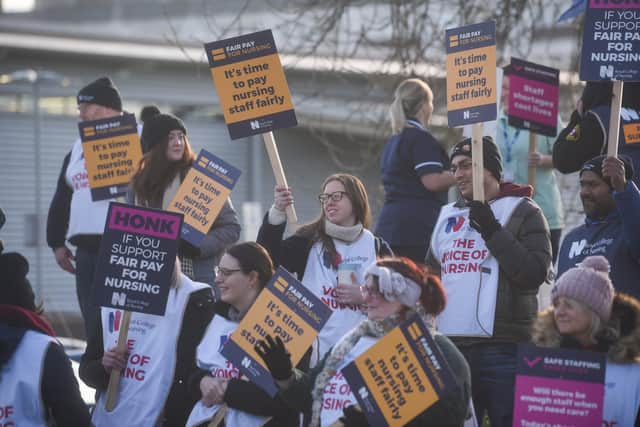

Lynn Sime was speaking to the Lancashire Post on Monday from the picket line outside her place of work, during the first of two days of strike action which she says is being wrongly portrayed by the government as a dispute purely about pay.
The ward sister says that wages do need a boost, but claims that the increases being demanded are as much about tempting more people to take up a career in nursing as they are about benefiting those already working in the profession.
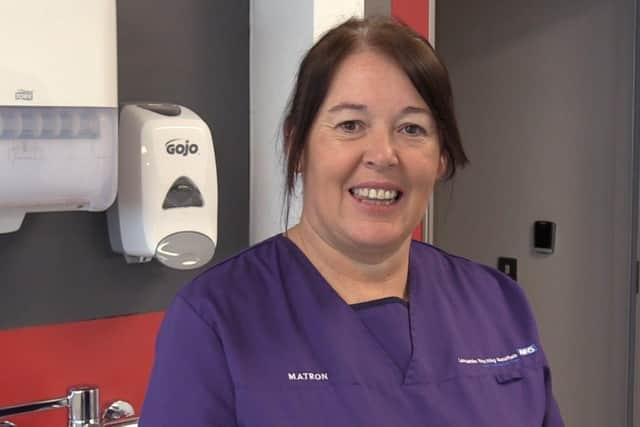

Advertisement
Hide AdAdvertisement
Hide AdWithout making jobs like hers a more attractive option, Lynn fears that the staff shortages that she says are crippling the health service at the moment risk leading to its eventual collapse.
“If we don't do it now, there won't be an NHS in a few years - it’ll be gone,” she warns.
“For me, it's about safe staffing and to get safe staffing you need to encourage people to come in with better pay and better working conditions - and encourage them to want to stay.
“At the minute, we’re haemorrhaging staff - it’s unbearable on the wards and in A&E, [because] we’re working on such poor staffing numbers. We have a transient workforce [of agency staff] who support those numbers, but they move on - they’re often only there for a shift.”
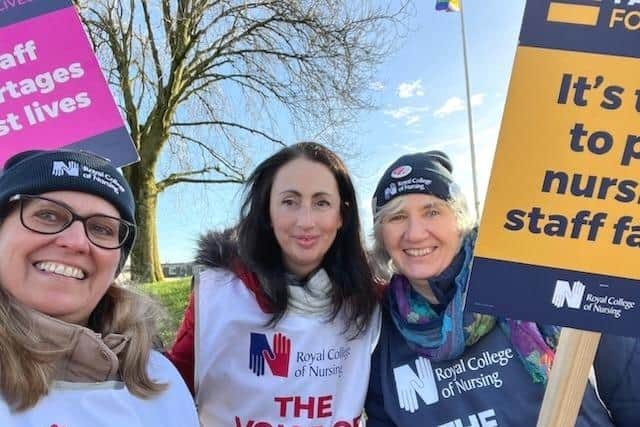

Advertisement
Hide AdAdvertisement
Hide AdLynn says that the scarcity of staff and the uncertainty about how many people are going to be available on any given day leaves nurses in a state of near-permanent panic about what they are going to be confronted with when they next walk through the door. It also means that there is a constant battle to get the balance of staff right for each area.
“Every nurse will have come across a situation where you've turned up for work and your heart sinks because you have not got the safe staffing numbers to deliver the care you want.
“We try and look across certain wards on our floors and try and move people around to balance it a bit better - but sometimes you don't have the staff to do that.
“It’s literally [a matter of] just trying to risk assess which ward is going to be more compromised than another - who’s got the sickest patients or who’s got the most dementia patients who need one-to-one [care]? It’s literally a risk assessment hour-by-hour.
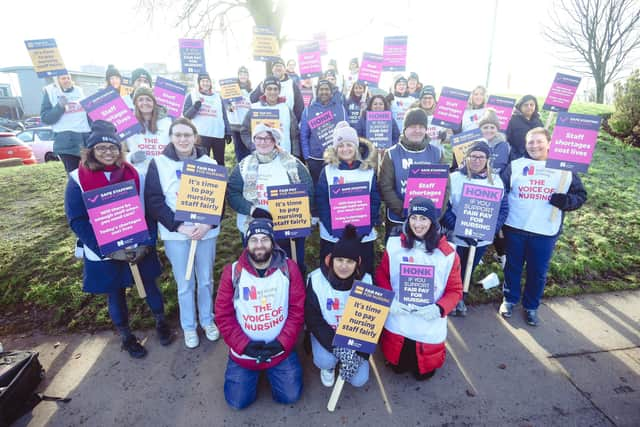

Advertisement
Hide AdAdvertisement
Hide Ad“I know nurses who are checking who they are on with the next day and are being told there’s nobody [else] down for [that shift] and it’s just them at the minute - and that nurse at home is then absolutely stressed thinking, ‘How am I going to do what I need to do tomorrow?’”
Lynn says that the worry felt before a shift is often replaced with regret after the working day is over.
“You go home and feel like you've done a very poor job and you get upset and frustrated, because all you want to do is go to work and deliver the care that you know the patients need.
“We want to care for our community - they have worked hard all their lives and they deserve to be looked after in their hour of need, but we can’t give them [that care],” Lynn added.
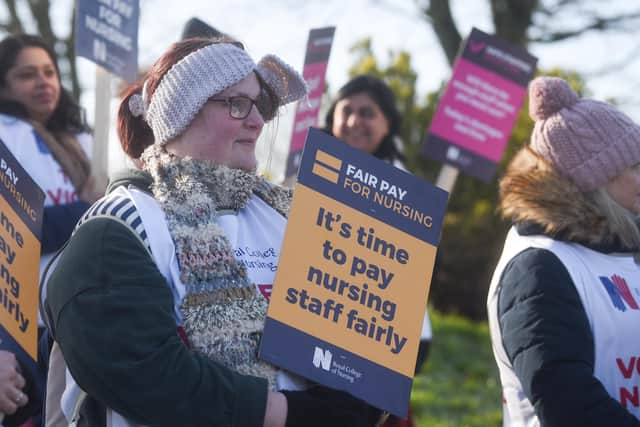

Advertisement
Hide AdAdvertisement
Hide AdMembers of the Royal College of Nursing (RCN) at both the Royal Preston and Chorley and South Ribble Hospital are this week taking part in a nationwide walkout affecting 73 hospital trusts in England Their current round of action continues and concludes on Tuesday, but on Monday they were also joined by ambulance workers, making it the biggest strike day in NHS history.
Gillian Coxhead, a nurse of 39 years - who has worked at the Royal Preston since 1987 and is due to retire within the next 12 months - told the Post that she wanted to leave behind an NHS that was fit for people to work in and be served by.
“We all expect that our jobs will change over a long period of time and we have seen so many changes in healthcare for the better - some really good research, innovation and new treatments - so there are so many things to celebrate in nursing.
“But I’ve seen a change significantly in the last five or six years in terms of staffing and the ratio of staff to patients.
Advertisement
Hide AdAdvertisement
Hide Ad“As a trust, we aspire to deliver excellent care with compassion. All these nurses on this picket line are passionate and compassionate about delivering the best care that they can - there’s no other reason to be a nurse.
“I’m coming to the end of my career, but I care about the future of nursing - it is the best job in the world, it’s such a privilege and I want the nurses of the future to be able to enjoy their careers and feel valued and respected for the work they do and the responsibility they take on. They’re dealing with people at some of the most vulnerable moments in their lives,” says Gillian, who has been an A&E sister for the past two decades.
She also highlighted the money being spent on agency staff to plug gaps in the rotas and said that it could be better utilised by ensuring that there were enough nurses in the first place.
“The [agency] nurses themselves are wonderful and some are regulars. We’re all committed to being flexible and responding to situations for the good of the patients, but it’s not a good situation to be in where you’ve got one nurse being paid one thing and another nurse being paid differently for doing the same job.”
Advertisement
Hide AdAdvertisement
Hide AdWhen she retires after turning 60, Gillian will go into a part-time role as a professional nurse advocate, charged with supporting nurses and helping them to build “resilience” - a skill which she suggests current working conditions mean is needed now more than ever.
Also on the picket line on Monday was Angela Siddiqui who moved from caring for patients to helping train medical students three years ago. She says that life on the wards was stressful enough even when she left her frontline nursing role.
“There are smaller and smaller numbers [of staff] looking after larger and larger numbers of patients - it’s just terrifying really, you can’t do a proper job that way. [Nurses] are just exhausted from the pandemic and there’s been no let up.
“You feel terrible for them every day dragging themselves in and doing their best when it’s just never enough.”
Advertisement
Hide AdAdvertisement
Hide AdAngela denies that the RCN’s opening gambit in its pay demand - almost 19 percent - was unrealistically high and has thwarted the organisation's attempts to seek to negotiate with the government since. The union’s general secretary, Pat Cullen, recently asked ministers to meet her “halfway” - but criticised their stance of not talking about the pay settlement for the current financial year, but only about a deal for next year.
The government says that most nurses have received between a four and five percent pay rise for 2022/23, depending on where they sit within their pay band.
Health and Social Care Secretary Steve Barclay, said it was “regrettable” that health unions had gone ahead with strike action.
“NHS contingency plans are in place but these co-ordinated strikes will undoubtedly have an impact on patients and cause delays to NHS services.
Advertisement
Hide AdAdvertisement
Hide Ad“We accepted the recommendations of the independent pay review body to give over one million NHS workers, including nurses and ambulance workers, a pay rise of at least £1,400 this financial year - on top of an increase the previous year when wider public sector pay was frozen.
“We prioritised £250 million of support last month for extra capacity in urgent and emergency care, but strikes this week will only increase the disruption faced by patients.
“The Governor of the Bank of England warned if we try to beat inflation with high pay rises, it will only get worse and people would not be better off.
“It is crucial people continue to access the services they need – please attend your appointments unless told otherwise, use 999 in a life-threatening emergency and use NHS 111 online services, your GP and pharmacy for non-urgent health needs.
Advertisement
Hide AdAdvertisement
Hide Ad“I have held constructive talks with the trade unions on pay and affordability and continue to urge them to call off the strikes. It is time for the trade unions to look forward and engage in a constructive dialogue about the pay review body process for the coming year.”
However, Angela Siddiqui - who was on the picket line from before dawn until after dusk on Monday and will be so again on Tuesday - says that nurses were right to ask for what they “deserve” - for the sake of the future of the profession, as well as those who are its current caring face.
“People have struggled with the pressure of coming out on strike, because they don't want patients to suffer, but also because of the difficulty of affording not to work. They are only just stretching their pay to be able to afford to feed themselves at the minute, so the thought of giving up another day’s pay is really difficult.
“But nurses are on the frontline with patients - it’s them that recognises if someone has deteriorated and tells the doctors to get them to act on it. Without nurses, you've got nothing.”
